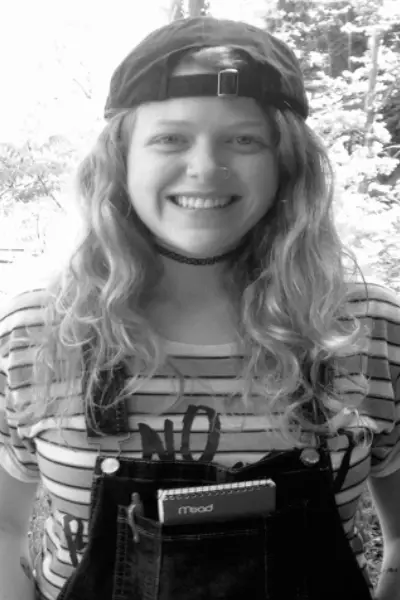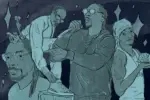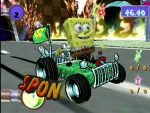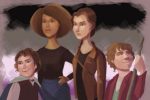No secret here: Millennials love “SpongeBob.”Although the very first episode aired May 1, 1999, I can’t (and won’t) stop quoting the show every day for the rest of my life. My friends and I have compared each other to certain characters on the show (I’m SpongeBob while my best friend’s Patrick), and sometimes I record episodes before I go to work, so not to miss anything hilarious. “SpongeBob” memes circulating Twitter have gone viral, including the “Mr. Krabs is shook” meme and “Caveman SpongeBob.”
“SpongeBob” has yet to get old, and I don’t see myself outgrowing the show, at least not anytime soon. But, its popularity raises the question: What exactly is it about “SpongeBob” that leaves my friends and I wanting to avoid our responsibilities to watch it for hours on end?
“SpongeBob” has substance; the show offers viewers more than surface-level jokes. My one roommate doesn’t watch “SpongeBob” because she’s unimpressed with the show’s “lack of depth,” but I challenge her refusal to give the cartoon a real chance. I know at times the yellow guy’s laugh is annoying, but here are some reasons why millennials love “SpongeBob” even today, and (probably) always will.
1. “SpongeBob” Brings Friends Together
You know those friends who bring out the absolute best in you, and sharing moments with them results in laughing so hard you think you may die? “SpongeBob” brings me the same kind of joy, and the show reminds me of every inside joke I’ve ever shared with my close-knit crew.
Laughter is important, especially when your life feels chaotic — I’ve got a dry sense of humor, and I tend to find the funny even in typically unfunny situations. “SpongeBob” makes me feel good, and it gives my friends and I something to talk about. Are some of the jokes idiotic? Absolutely, but so are my friends and I, which is why “SpongeBob” brings us closer together.
2. It Promotes Creativity
Clearly thinking up a show, creating characters and writing episodes in general is astonishing, but specific “SpongeBob” episodes are legendary, some may say iconic. The “Imagination” episode is clever, because it directly focuses on making shit up for amusement.
SpongeBob is always finding his way out of difficult situations, like when he “lost his identity” (his name tag), and/or needed to find a new shell for his pet snail Gary. Although “SpongeBob” seems simple, the cartoon is rad in the way SpongeBob handles being congenial, eccentric and emotional.
3. Squidward’s Relatability
Squidward is underrated. There I said it. Viewers have always been able to connect with Squidward because he never gets what he wants. Even in moments when he succeeds, really he doesn’t.
Squidward is Holden Caulfield cynical, and outwardly expresses his hate for his neighbors, SpongeBob and Patrick, but really he hates pretty much everyone and everything.
Squidward is always getting s— on — he wants to quit his job, wishes he was better at what he loves (playing clarinet) and his name is always being misspelled or misread. Squidward sounds a lot like a millennial/college student — sifting through the bull—-, trying to feel good about yourself. You feel bad for Squidward, but you also have a hard time rooting for him because he’s mean, making him a complex character.
4. Epic Music
I wouldn’t say I’m a “goofy goober,” but I will say the song is a jam nonetheless. “SpongeBob” offers viewers solid tunes every single episode, although some songs are more memorable than others. I will never forget the best halftime show performance to have ever happened in the history of halftime shows, another meme for Twitter when the Super Bowl comes around.
Music adds another level of intensity and coolness to the show, like “Best Day Ever,” and SpongeBob’s very popular hit about staying “indoors.” Music brings people together, therefore “SpongeBob” brings people together, it’s essentially a universal truth.
5. The Flawed Characters
Referring back to Squidward, his role on the show is to vocalize his irritation with his neighbors, as well as his life as a whole — his presence creates tension between characters. Squidward’s not the only character who has more to him than a couple of funny jokes. (Besides, Squidward’s really not funny).
Mr. Krabs is a pompous jerk who takes being materialistic to a whole new level. His greed blinds him as he fails to form any kind of strong relationship with anybody.
He’s always scheming, planning out how to make more money. There’s an episode where Mr. Krabs refuses to forgive Squidward for stealing his very first dime (he didn’t even steal it by the way.)
Plankton is the stereotypical “evil villain” character who wants to steal from Mr. Krabs. Plankton is obviously insecure, and lacks originality; he can’t come up with his own ideas and flourish, instead he has to try to ruin other people.
Regardless, watching an episode of “SpongeBob” will make you laugh, but also think—why did they (the writers) decide to have them (the characters) do this? There’s more going on than what initially meets the eyes and ears, which is harmless fun, but the characters are deep, too.
6. The Beauty of Bonding
College students needs friends like they need money, which is badly. Support is necessary in life; it helps you to succeed in whatever you choose to do. SpongeBob and Patrick have an unbreakable bond on the show, even when their relationship hits rock bottom.
For example, the “best friends forever” rings prove their loyalty to each other. The show puts a focus on SpongeBob’s relationship with Patrick, but makes sure to include SpongeBob interacting with a variety of characters, all of which bring out different sides of him. I relate to this wholeheartedly, because who you choose to spend your time with is incredibly important.
“SpongeBob” is great TV because the show is not one dimensional. I’m convinced it’s the most quoted cartoon on and off social media. I’m not sick of “SpongeBob,” and I’m not sure I ever will be, as long as I continue to laugh and enjoy the levels of complexity displayed in even the newest of episodes.


















Hi! It is my favourite cartoon. When I was a child I leved it. SpongeBob is amusing.